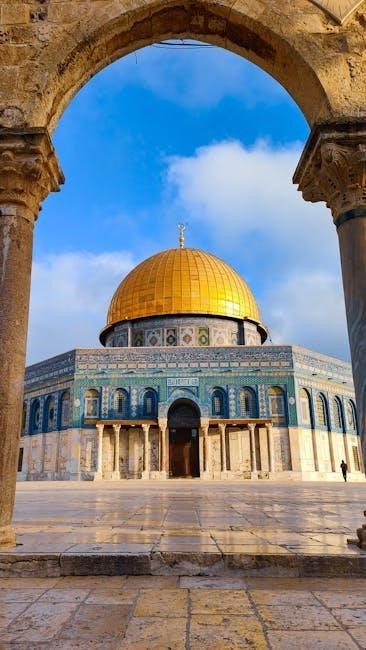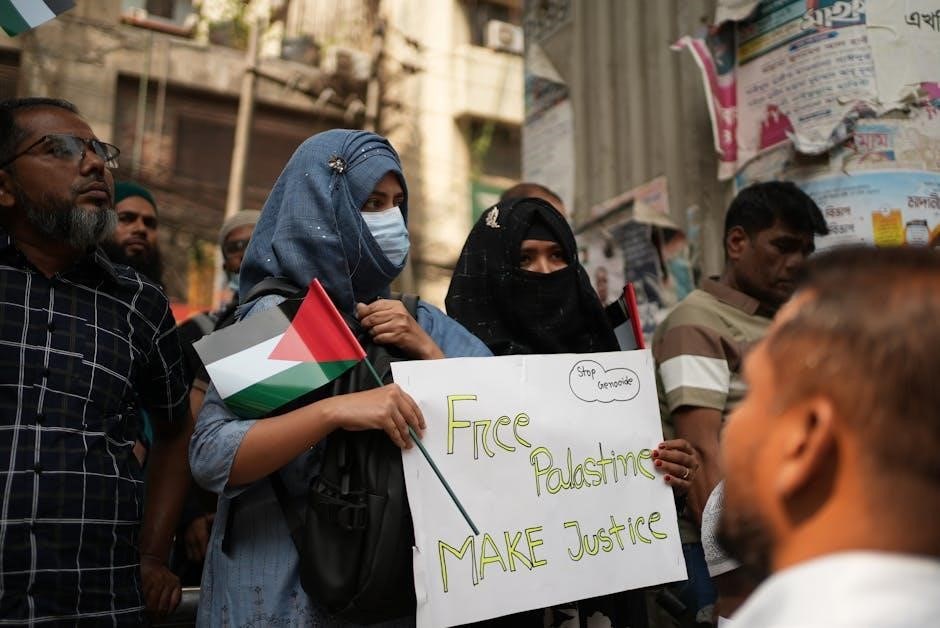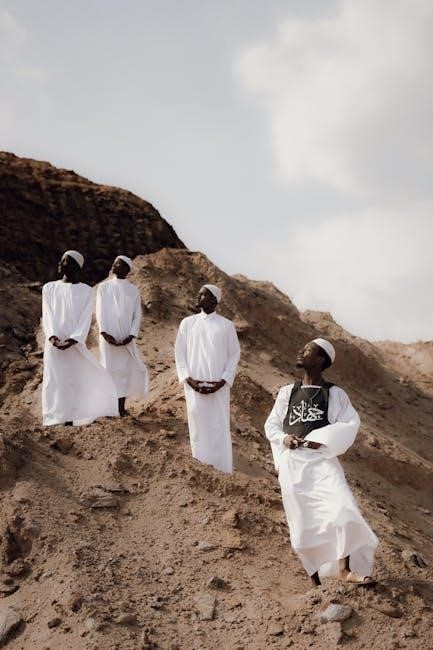The Hundred Years War on Palestine by Rashid Khalidi offers a comprehensive analysis of the century-long conflict, tracing its roots to the 1917 Balfour Declaration and its enduring impact through settler colonialism and resistance, providing a fresh historical perspective on the Palestine-Israel conflict.
Overview of “The Hundred Years War on Palestine”
The Hundred Years War on Palestine by Rashid Khalidi is a landmark history that examines the century-long conflict between Palestinians and Zionists. The book spans from the 1917 Balfour Declaration to the 2017 era, tracing the roots of settler colonialism and resistance. Khalidi, a renowned historian, weaves together historical analysis with personal narratives, drawing from his own family’s archives. The work challenges conventional narratives, offering a fresh interpretation of the conflict as a continuous struggle against colonialism. It highlights the role of external powers, such as Britain and the U.S., in shaping the war. By blending scholarly rigor with personal insight, Khalidi provides a compelling account of Palestine’s resilience and the ongoing nature of the conflict.
Author Rashid Khalidi and His Historical Perspective
Rashid Khalidi, a distinguished historian and descendant of a prominent Palestinian family, brings a unique perspective to The Hundred Years War on Palestine. His work combines academic rigor with personal insights, drawing from family archives and historical records. Khalidi challenges traditional narratives by framing the conflict as a protracted struggle against settler colonialism. He examines the roles of external powers and internal political dynamics, offering a nuanced understanding of the conflict’s evolution. His approach emphasizes the agency of Palestinians, countering narratives that marginalize their experiences. By integrating personal and historical dimensions, Khalidi provides a compelling and authoritative account of the Palestine-Israel conflict, shedding light on its ongoing complexities.
Significance of the Book in Understanding the Palestine-Israel Conflict
The Hundred Years War on Palestine is a landmark work that reshapes understanding of the Palestine-Israel conflict by situating it within the framework of settler colonialism; Khalidi’s meticulous analysis reveals the continuous nature of displacement and resistance, offering a fresh lens to view historical events. The book’s significance lies in its ability to connect past injustices with present-day realities, providing a coherent narrative of Palestinian struggles. By exploring the roles of external powers and internal resistance, it challenges dominant Zionist narratives, making it an essential resource for scholars and general readers seeking a comprehensive and balanced perspective on the conflict.

Historical Context
The Hundred Years War on Palestine traces the conflict’s origins to the 1917 Balfour Declaration, highlighting British support for Zionist settlement and the subsequent rise of settler colonialism.
The Balfour Declaration of 1917 and Its Impact
The Balfour Declaration, issued in 1917, marked a pivotal moment in the history of Palestine; This British government statement expressed support for the establishment of a Jewish homeland in Palestine, then under Ottoman rule. The declaration legitimized Zionist aspirations and dismissed the rights of the Palestinian Arab majority, setting the stage for a century of conflict. Its impact was profound, shaping the geopolitical landscape and fueling resistance from Palestinian Arabs. Rashid Khalidi examines how this document laid the foundation for settler colonialism and its enduring consequences, including displacement and ongoing violence, central to the narrative of The Hundred Years War on Palestine.
British Mandate and the Rise of Settler Colonialism
The British Mandate over Palestine (1920–1948) institutionalized settler colonialism, fostering Zionist immigration and land acquisition while marginalizing Palestinian Arabs. This period saw the establishment of Jewish institutions and infrastructure, backed by British policies that prioritized Zionist goals. Palestinian resistance grew as displacement and land confiscation intensified, leading to violent clashes. Khalidi highlights how the Mandate era entrenched a system of inequality, with Britain’s support for Jewish state-building directly contributing to the ongoing conflict. This framework set the stage for Israel’s establishment and the perpetuation of settler colonial practices, as detailed in The Hundred Years War on Palestine.
The Role of Zionist Movement in Shaping the Conflict
The Zionist movement played a pivotal role in shaping the Palestine-Israel conflict by advocating for a Jewish homeland in Palestine. Through political lobbying and immigration efforts, Zionists sought to establish a sovereign state, often clashing with Palestinian Arab populations. Khalidi’s analysis reveals how Zionist strategies, including land purchases and the creation of armed groups like the Haganah, laid the groundwork for Israel’s establishment. This movement’s actions were supported by external powers, particularly Britain, during the Mandate period. The Zionist movement’s insistence on exclusivist claims to the land deepened the conflict, setting the stage for ongoing violence and displacement, as explored in The Hundred Years War on Palestine.

Key Events in the Hundred Years War
The 1948 Arab-Israeli War, 1967 Six-Day War, First Intifada (1987-1993), Second Intifada (2000-2005), and Israeli Siege of Gaza (21st century) shaped the conflict’s trajectory;
The 1948 Arab-Israeli War and Its Consequences
The 1948 Arab-Israeli War marked the establishment of Israel and the displacement of Palestinians, known as the Nakba or “catastrophe” in Arabic. This conflict arose from the UN Partition Plan of 1947, which divided Palestine into Jewish and Arab states, leading to violence as Arab states rejected the plan. The war resulted in Israel’s expansion beyond allocated territories, the expulsion of hundreds of thousands of Palestinians, and the destruction of villages. The consequences were profound: the creation of a long-lasting refugee crisis, ongoing territorial disputes, and a deepening political and humanitarian conflict that continues to shape the region today.
The 1967 Six-Day War and Occupation of Palestinian Territories
The 1967 Six-Day War was a pivotal event in the Hundred Years War on Palestine, resulting in Israel’s occupation of the West Bank, Gaza Strip, and East Jerusalem. This conflict began as tensions escalated between Israel and Arab states, leading to a preemptive strike by Israel. The war concluded with Israel’s territorial expansion, displacing Palestinians and intensifying settler colonialism. The occupation has persisted, marked by ongoing military control, human rights abuses, and the expansion of settlements, further entrenching the conflict and complicating prospects for peace. This period remains a cornerstone of modern Palestinian dispossession and resistance.
The First Intifada (1987-1993) and Its Significance
The First Intifada, spanning from 1987 to 1993, was a mass uprising of Palestinians against Israeli occupation. It began with spontaneous protests in Gaza, spreading across the West Bank and East Jerusalem. Characterized by civil disobedience, strikes, and stone-throwing, it marked a shift from armed resistance to grassroots activism. The Intifada highlighted Palestinian resilience and unity, drawing global attention to their plight. It also led to the emergence of Hamas as a significant political force. Despite harsh Israeli crackdowns, the Intifada galvanized international support and laid the groundwork for the Oslo Accords, though its legacy remains contested in the ongoing struggle for Palestinian self-determination.
The Second Intifada (2000-2005) and Escalation of Violence
The Second Intifada, beginning in 2000, marked a violent escalation in the Palestine-Israel conflict. Triggered by Ariel Sharon’s visit to the Temple Mount, it saw widespread suicide bombings by Palestinian groups and severe Israeli military responses. Operations like “Defensive Shield” led to high civilian casualties and widespread destruction. The Intifada intensified settler colonial violence and deepened divisions. It ended unofficially around 2005 with a ceasefire, but the period solidified Israel’s separation barrier and Hamas’s rise. This phase underscored the cyclical nature of violence and the entrenched positions of both sides, leaving a legacy of trauma and unresolved conflict in Palestine;
Israeli Siege of Gaza and Wars in the 21st Century
The Israeli siege of Gaza intensified in the 21st century, marked by intermittent wars and blockades. Operations like “Cast Lead” (2008-2009) and “Protective Edge” (2014) caused massive civilian casualties and infrastructure destruction. These conflicts highlighted Israel’s military dominance and Gaza’s humanitarian crises. The siege, justified by Israel as security measures, has severely impacted Gaza’s economy and population. The ongoing blockade and periodic escalations underscore the unresolved nature of the conflict, with external powers like the U.S; and regional actors playing significant roles in perpetuating the impasse. This modern phase of the war reflects the enduring struggle for Palestinian self-determination and statehood.

Role of External Powers
External powers have shaped the Palestine-Israel conflict, with Britain’s Balfour Declaration and U.S. support for Israel being pivotal. Their involvement has perpetuated the century-long struggle, influencing its trajectory significantly.
British Support for Zionist Settlement in Palestine
The British Empire’s 1917 Balfour Declaration marked the beginning of Zionist settlement in Palestine, promising a homeland for Jews while disregarding Palestinian rights. This policy, implemented during the British Mandate, facilitated Jewish immigration and land acquisition, often at the expense of the indigenous Arab population. The British government’s favoritism towards Zionism was rooted in strategic interests, aiming to establish a loyal colony in the region. This support laid the foundation for the Israeli-Palestinian conflict, as it enabled the creation of a settler-colonial state that would displace Palestinians and spark decades of resistance and violence. The declaration remains a contentious symbol of colonial intervention.
US Involvement and Its Impact on the Conflict
US involvement in the Palestine-Israel conflict has been pivotal, with America emerging as a key supporter of Israel after World War II. Financial, military, and diplomatic aid from the US has bolstered Israel’s position, often at the expense of Palestinian aspirations. This support has been driven by strategic interests, domestic politics, and ideological alignments. However, it has also exacerbated tensions, as unconditional aid has been criticized for enabling Israeli expansionism and undermining peace negotiations. The US veto of UN resolutions critical of Israel underscores its protective role, further entrenching the conflict and complicating efforts to achieve a balanced resolution.
Regional Actors and Their Influence on the War
Regional actors, such as Egypt, Jordan, and the Arab League, have played significant roles in shaping the Palestine-Israel conflict. Egypt’s involvement in the 1948 Arab-Israeli War and subsequent wars, like the 1967 Six-Day War, underscored its influence. Jordan, under King Abdullah, pursued distinct policies, sometimes clashing with Palestinian leadership. The Arab League, formed in 1945, sought to unify Arab states in support of Palestinian causes but often struggled with internal divisions. These actors’ actions, whether through military engagement, diplomatic efforts, or political alliances, have profoundly impacted the conflict’s trajectory, sometimes exacerbating tensions and other times seeking to mediate or resolve them.
Settler Colonialism and Resistance
Settler colonialism in Palestine has driven displacement and resistance, with Zionist expansion displacing Palestinians, fostering prolonged conflict. Resistance movements, from armed struggle to nonviolent protests, persist as a resilience response.

Understanding Settler Colonialism in Palestine
Settler colonialism in Palestine refers to the displacement of indigenous Palestinians by Zionist settlers, backed by British and later U.S. support. Rooted in the 1917 Balfour Declaration, it aimed to establish a Jewish homeland, ignoring Palestinian rights. The British Mandate facilitated Jewish immigration, leading to land expropriation and violence; Post-1948, Israel expanded settlements, particularly after 1967, entrenching occupation. Resistance, from armed struggle to nonviolent protests, has persisted, highlighting the ongoing nature of colonial displacement and its enduring impact on the Palestine-Israel conflict, framed by power imbalances and international intervention.
Palestinian Resistance Movements and Their Evolution
Palestinian resistance has evolved significantly over a century, adapting to shifting political and military realities. Early movements focused on armed struggle against British rule and Zionist expansion, while post-1948 efforts emphasized reclaiming lost lands. The First Intifada (1987–1993) marked a shift to mass, nonviolent protests, asserting Palestinian identity and rights. The Second Intifada (2000–2005) saw a resurgence of armed resistance alongside continued civil disobedience. Today, resistance encompasses diverse tactics, from grassroots activism to international advocacy, reflecting resilience and adaptability in the face of prolonged occupation and dispossession.
The Role of International Law in the Conflict
International law has played a pivotal role in shaping the Palestine-Israel conflict, with key frameworks like the Balfour Declaration, UN resolutions, and the Geneva Conventions influencing its trajectory. The 1947 UN Partition Plan and Resolution 242 are frequently cited, yet their interpretations remain contested. Israel’s settlement expansion and Gaza’s blockade are critiqued under humanitarian law, while Palestinian rights to self-determination are upheld in international forums. The conflict underscores the tension between legal principles and geopolitical realities, as external powers often bypass or manipulate legal frameworks to justify their actions. This dynamic highlights the enduring struggle to apply universal legal standards to a deeply asymmetric conflict.

Themes and Interpretations
The Hundred Years War on Palestine explores themes of settler colonialism, resistance, and the interplay of family history with broader historical events, offering a fresh, personal perspective on the conflict.
Family History and Personal Narratives in the Book
Rashid Khalidi intertwines his family’s history with the broader Palestinian narrative, offering a deeply personal perspective on the conflict. Drawing from family archives, he highlights how individual experiences reflect the wider struggle against settler colonialism. Khalidi’s ancestors, including his great-great-great-uncle Yusuf Diya al-Din Pasha al-Khalidi, played significant roles in Palestinian history, providing a unique lens through which to view the conflict. This personalization humanizes the historical account, making the book more engaging and emotionally resonant. By weaving family stories into the historical fabric, Khalidi underscores the enduring impact of colonialism on Palestinian lives and identity.
A Fresh Interpretation of the Palestine-Israel Conflict
Rashid Khalidi presents a groundbreaking reinterpretation of the Palestine-Israel conflict, challenging conventional narratives by framing it as a century-long colonial war. He integrates historical analysis with personal and family histories, offering a unique lens through which to view the struggle. Khalidi’s approach emphasizes the role of settler colonialism and external powers, providing a balanced perspective that neither romanticizes nor oversimplifies the conflict. By centering Palestinian agency and resistance, he humanizes their experiences while critiquing the failures of leadership on both sides. This fresh interpretation underscores the ongoing nature of the conflict, urging readers to reconsider its historical and contemporary dimensions.
The Ongoing Nature of the Conflict and Its Implications

Khalidi’s work underscores the enduring nature of the Palestine-Israel conflict, highlighting its persistence beyond historical milestones. The book reveals how colonial policies and external interventions have perpetuated instability, making a resolution elusive. By examining the cyclical patterns of violence and resistance, Khalidi illustrates the deepening entrenchment of settler colonialism. This ongoing conflict has profound implications for regional stability, global geopolitics, and human rights. The author emphasizes the need for a nuanced understanding of the conflict’s historical roots to forge a path toward justice and peace, stressing the urgency of addressing these issues in the contemporary context.

Reception and Impact
The Hundred Years War on Palestine has received critical acclaim for its fresh perspective and meticulous scholarship, significantly contributing to historical discourse and public understanding of the conflict.

Critical Reception of the Book

The Hundred Years War on Palestine has garnered widespread critical acclaim for its meticulous scholarship and fresh interpretation of the conflict. Reviewers praise Rashid Khalidi’s ability to interweave personal family history with broader historical events, offering a unique lens through which to view the Palestine-Israel conflict. The book has been lauded as a landmark work that challenges conventional narratives, providing a deeper understanding of settler colonialism and resistance. Its accessibility and scholarly rigor have made it a significant contribution to both academic and general readers, fostering a more nuanced discourse on the ongoing struggle.
The Book’s Contribution to Historical Scholarship
The Hundred Years War on Palestine significantly advances historical scholarship by reframing the conflict as a sustained colonial war, rather than a series of isolated events; Khalidi’s meticulous analysis of settler colonialism and resistance provides a new paradigm for understanding the Palestine-Israel conflict. By integrating personal and family narratives, the book humanizes the historical account, offering a unique perspective that bridges academic rigor with personal insight. This approach challenges traditional historiographies, encouraging scholars to reconsider the role of colonialism and resistance in shaping the region’s history. The book’s interdisciplinary approach has set a new standard for historical research on the subject.
Public Response and Its Role in Modern Discourse
The Hundred Years War on Palestine has sparked significant public discourse, with readers and scholars praising its fresh interpretation of the conflict. The book’s accessibility and depth have bridged academic and public audiences, fostering wider conversations about settler colonialism and resistance. Its digital availability, including PDF formats, has further amplified its reach, making it a key resource for modern discussions on Palestine-Israel relations. The text has also been highlighted in various media and podcasts, ensuring its ideas influence contemporary debates. By challenging traditional narratives, Khalidi’s work has become a catalyst for rethinking the conflict’s historical and ongoing implications.
The Hundred Years War on Palestine concludes with a poignant reflection on the enduring conflict, emphasizing the need for a just and peaceful resolution.
Rashid Khalidi’s The Hundred Years War on Palestine presents a compelling narrative of the century-long conflict, emphasizing settler colonialism and resistance. He argues that the conflict began with the 1917 Balfour Declaration, which set the stage for Zionist settlement and British support. Khalidi highlights the role of external powers, particularly Britain and the U.S., in perpetuating the conflict. He also underscores the agency of Palestinians, detailing their resistance movements and the enduring struggle for self-determination. By weaving personal family history with broader historical events, Khalidi offers a fresh perspective, illustrating the ongoing nature of the conflict and its profound implications for the region and the world.
Reflections on the Future of the Palestine-Israel Conflict
Khalidi’s analysis suggests that the Palestine-Israel conflict remains unresolved due to persistent colonial dynamics and external interventions. He emphasizes the need for a paradigm shift, recognizing Palestine’s right to self-determination and challenging the settler-colonial framework. The book underscores the importance of international law and accountability in achieving justice. Khalidi’s reflections highlight the urgency of addressing historical injustices and the ongoing displacement of Palestinians. He advocates for a negotiated settlement that prioritizes equality and human rights, offering a pathway toward peace and coexistence in the region.
